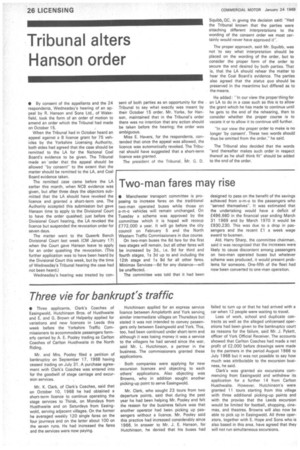Tribunal alters Hanson order
Page 28

If you've noticed an error in this article please click here to report it so we can fix it.
• By consent of the appellants and the 24 respondents, Wednesday's hearing of an appeal by R. Hanson and Sons Ltd., of Wakefield, took the form of an order of motion to amend an order which the Tribunal had made on October 15.
When the Tribunal had in October heard an appeal against a B licence grant for 75 vehicles by the Yorkshire Licensing Authority, both sides had agreed that the case should be remitted to the LA for the National Coal Board's evidence to be given. The Tribunal made an order that the appeal should be allowed "by consent" to the extent that the matter should be remitted to the LA, and Coal Board evidence taken.
The remitted case came before the LA earlier this month, when NCB evidence was given, but after three days the objectors submitted that the LA should have revoked the licence and granted a short-term one. The Authority accepted this submission but gave Hanson time to apply to the Divisional Court to have the order quashed; just before the Divisional Court hearing, the LA revoked the licence but suspended the revocation order for seven days.
The matter went to the Queen's Bench Divisional Court last week (CM January 17) when the Court gave Hanson leave to apply for an order quashing the revocation. (This further application was to have been heard by the Divisional Court this week, but by the time of Wednesday's Tribunal hearing the case had not been heard.)
Wednesday's hearing was treated by con
sent of both parties as an opportunity for the Tribunal to say what exactly was meant by their October 15 order. Mr. Yorke, for Hanson, maintained that in the Tribunal's order there was no intention that any action should be taken before the hearing; the order was ambiguous.
Miss E. Havers, for the respondents, contended that once the appeal was allowed, the licence was automatically revoked. The Tribunal should have suggested that a short-term licence was granted. The president of the Tribunal, Mr. G. D. Squibb, QC, in giving the decision said; "Had the Tribunal known that the parties were attaching different interpretations to the wording of the consent order we most certainly would never have approved it".
The proper approach, said Mr. Squibb, was not to say what interpretation should be placed on the wording of the order, but to consider the proper form of the order to secure the end desired by both parties. That is, that the LA should rehear the matter to hear the Coal Board's evidence. The parties also agreed that the siatus quo should be preserved in the meantime but differed as to the means.
He added: "In our view the proper thing for an LA to do in a case such as this is to allow the grant which he has made to continue until he gets to the end of the rehearing, then to consider whether the proper course is to vacate it or to allow it to continue still further.
"In our view the proper order to make is no longer by consent'. These two words should thus be omitted from the order," he said.
The Tribunal also decided that the words "and thereafter makes such order in respect thereof as he shall think fit" should be added to the end of the order.








































































































